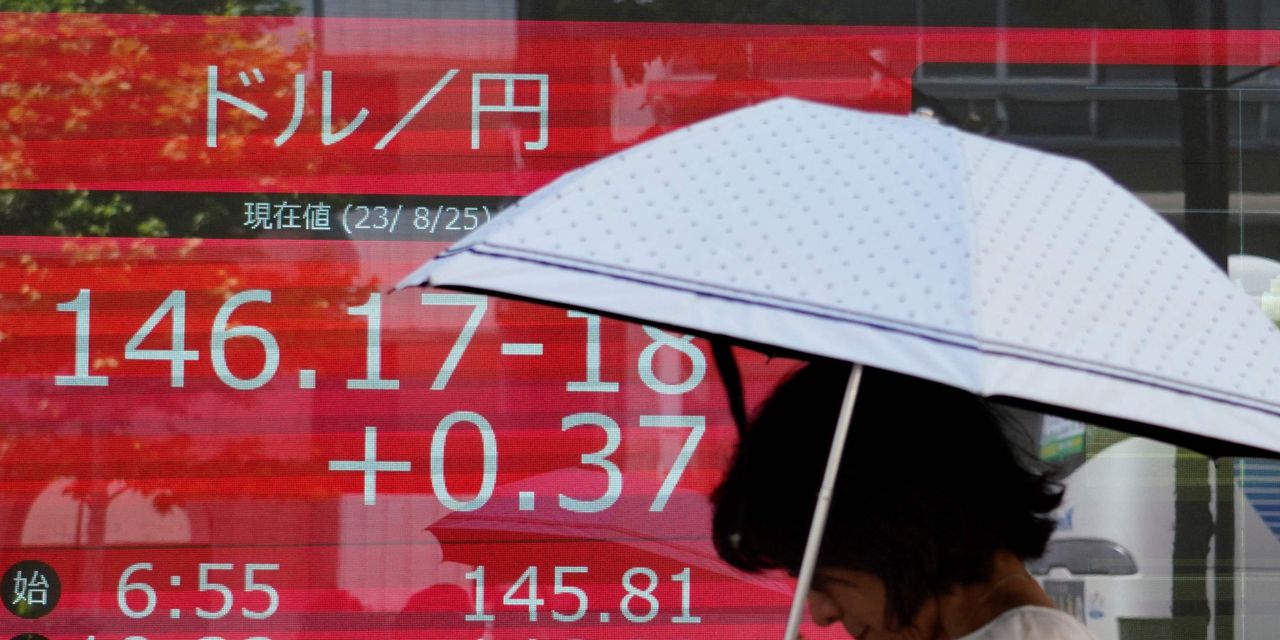The U.S. dollar tumbled against the yen and Japanese government bond yields soared on Monday, after Bank of Japan Governor Kazuo Ueda hinted that the country’s long-running negative interest rate policy could be nearing an end.
The dollar
USDJPY,
slumped 0.6% to ¥146.00, having at one point on Friday reached as high as ¥147.90, while the 10-year Japanese government bond yield
BX:TMBMKJP-10Y
climbed 5.2 basis points to 0.702% — a level not seen since 2014. U.S. Treasury bonds yields also edged higher, with that of the 10-year
BX:TMUBMUSD10Y
up 2 basis points to 4.284%.
The BOJ’s Ueda reportedly told the Yomiuri newspaper in an interview over the weekend that by the end of 2023, the central bank should have an idea about whether its decade of easy monetary policy can come to an end.
“Once we’re convinced Japan will see sustained rises in inflation accompanied by wage growth, there are various options we can take,” Ueda reportedly said. “If we judge that Japan can achieve its inflation target even after ending negative rates, we’ll do so.”
Bank of Japan policy board member Naoki Tamura said Wednesday that the central bank’s goal for sustainable 2% inflation appears to be finally in sight. The country has seen inflation stubbornly higher in some areas of the economy, though, falling energy prices have eased price pressures.
The comments were a factor in a shift in Deutsche Bank’s call on the Bank of Japan’s monetary policy outlook. The bank told clients in a note published Monday that its economists now expect yield curve control in the country to be removed in October, versus a previous target of April 2024. They see negative interest rate policy ending in January, versus a prior target of December 2024.
In late July, the BOJ tweaked its yield-curve control program, further loosening a cap on how high the 10-year Japanese government bond can rise. That move also triggered a jump in U.S. Treasury yields and weighed on a U.S. stock market rally. However, U.S. stock futures indicated a higher start for Wall Street on Monday.
But some have worried that if the BOJ ends its ultraloose monetary policy, Japanese investors might switch out of their U.S. Treasury holdings to buy JGBs, pushing up U.S. and global yields. Yields and debt prices move in opposite directions.
“The BOJ is the last holdout of the major central banks still supplying liquidity to world markets, so if they get serious about tightening as well, what does that mean for asset prices, yields and financial stability?” wrote Benjamin Picton, senior macro strategist at Rabobank, in a note to clients.
“It’s little wonder that other central banks are starting to second guess themselves if the last shock absorber is soon to disappear, especially since there is little prospect of China riding to the rescue as it has done in the past,” he said.
Up 24% so far this year and among the world’s better-performing stock markets over that period, the Nikkei 225
JP:NIK
fell 0.4% on Monday. The dollar’s strength has been most visible against the yen this year, with the greenback up 11.5% on that cross.
Read: A rising U.S. dollar is ringing alarm bells overseas. Should stock-market investors worry?
Read the full article here





